USAID-NREL Partnership Newsletter – Spring 2021
Read our Spring 2021 issue for updates on our country activities, events, global technical platforms, and resources.
The USAID-NREL Partnership addresses critical challenges to scaling up advanced energy systems through global tools and technical assistance, including the Renewable Energy Data Explorer, Greening the Grid, the International Jobs and Economic Development Impacts tool, and the Resilient Energy Platform.
Featured News
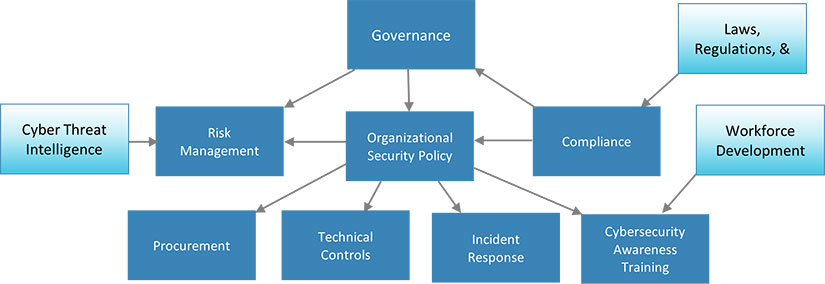
Cybersecurity Building Blocks Designed To Improve Security for Electrical Grid
Developing a robust cybersecurity defense program is critical to enhancing grid security and power sector resilience. But how can utility leaders fortify their cybersecurity and ensure that resources go where they are needed most?
Stemming from discussions with utilities around the world, as well as past cybersecurity assessments performed by NREL for dozens of utilities and government agencies, USAID and NREL, through the Resilient Energy Platform, developed a "building block" approach for understanding cybersecurity challenges faced by small and under-resourced utilities. The building blocks define clusters of related activities within a balanced cybersecurity program and provide references and resources for each area. The Power Sector Cybersecurity Building Blocks are not meant to be the final word on cybersecurity for the power sector, as this field is evolving rapidly with the introduction of new power grid technology and an ever-changing threat landscape. USAID and NREL welcome discussion regarding updates to future iterations of these building blocks.
Explore the full Power Sector Cybersecurity Building Blocks technical report, as well as other cybersecurity fact sheets and webinars, on the cybersecurity resilience webpage of the Resilient Energy Platform.
Join USAID and NREL at the 2021 Asia Clean Energy Forum!
USAID and NREL are hosting several events at the upcoming 2021 Asia Clean Energy Forum.
Deep Dive Workshop: From Dreams to Reality — Achieving NDCs through Power Sector Planning and Implementation – June 18, 2021, at 10:30 a.m. Manila Time (GMT+8)
Nationally Determined Contributions (NDCs) under the Paris Agreement are driving governments across Asia to encourage clean energy deployment, power sector modernization, and uptake of novel technologies including smart meters, energy storage, and electric vehicles. This workshop will describe the progressive stages of clean energy transitions as well as challenges and solutions for achieving these transitions. Case studies from the Philippines, India, and California, among others, will provide the latest information about lessons learned and emerging best practices for clean energy planning and implementation. Registration for this session can be found on the Asia Clean Energy Forum website.
Spotlight Session: The Future of E-Mobility in Asia: Goals, Challenges, and Holistic Solutions – June 15, 2021, at 8 p.m. Manila Time (GMT+8)
This workshop will explore how to plan, implement, and scale electric vehicle (EV) deployment in Asia based on international best practices and on-the-ground experience. The session will discuss topics crucial to accelerating inclusive, resilient, and sustainable e-mobility at scale, such as data management, electric vehicle supply equipment (EVSE) standards, tariff design, charging infrastructure, and more. It will also feature EV work implemented on the ground with USAID, including EVSE standards and tariff design in the Lao People's Democratic Republic, grid impacts of EVs in India, as well as the USAID-NREL Partnership's new global EV Toolkit.
Side Session: Decarbonization Pathways in South Asia – June 17, 2021, at 8 a.m. Manila Time (GMT +8)
USAID-India and the South Asia Group for Energy are hosting an Asia Clean Energy Forum side session focused on pathways for decarbonization in South Asia. The session will highlight challenges and solutions for key sectors including power, industry, buildings, and transportation and will explore questions at the intersection of policy, research, and implementation to better understand the barriers to scaling up clean energy solutions.
Reinforcing Advanced Energy Systems Project Ushers in Next Phase of Collaboration in Bangladesh
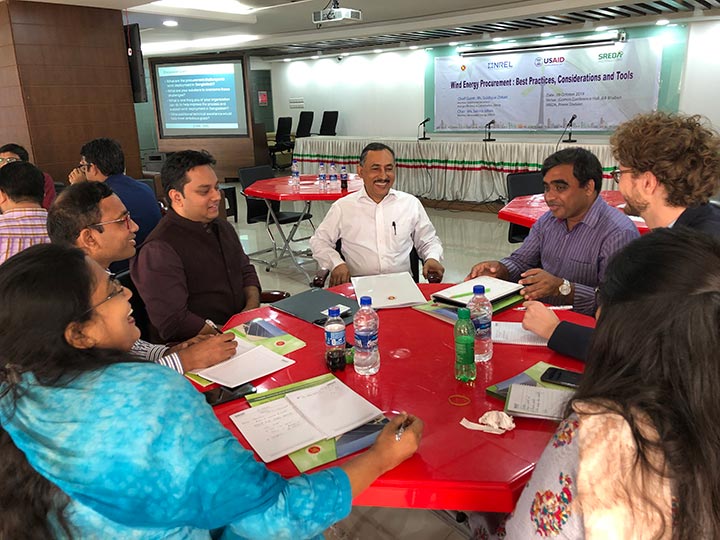
A table of stakeholders, taken during the private sector roundtable discussions in 2019. Photo by Carishma Gokale-Welch, NREL
For several years, the USAID-NREL Partnership provided technical assistance supporting the government of Bangladesh's goal of promoting renewable energy development to stimulate private sector investment, spur economic development, and meet growing energy demand through domestic energy resources.
Building on past and ongoing work, this collaboration is evolving into a new phase called Reinforcing Advanced Energy Systems and will provide world-class technical support for scaling up and deploying advanced energy systems to support the transition to sustainable, secure, and market-driven energy sectors in Bangladesh. Key activities needed to spur this transition include creating robust energy policies and developing plans and best practices that can be effectively deployed. To enable this, Reinforcing Advanced Energy Systems activities will be designed to improve the use of data-driven decision-making for energy policies and practices, increase the adoption of best practices and advanced approaches to energy planning and policymaking, and improve robustness of in-country analytical capabilities for energy decision-making.
Learn more by visiting Reinforcing Advanced Energy Systems in Bangladesh.
More information about USAID and NREL's wind energy market development work in Bangladesh can be found in the ClimateLinks blog From the Ground Up: Building Bangladesh's Wind Energy Market.
Building Blocks of Energy Efficiency in Action

South Africa's Energy Efficiency Standards and Labeling program
From our partners at the U.S. Department of Energy Lawrence Berkeley National Laboratory
In recent years, strategies for low-emission development around the world consider energy efficiency advancement as an essential step to achieving climate targets and meeting growing energy demand. Although the benefits of energy efficiency are increasingly recognized from both a climate and security perspective, creating an enabling environment in which energy efficient policies can thrive requires significant upfront investment and political support. Helping develop such a framework is the mission of the Energy Efficiency for Development (EE4D) initiative, supported by USAID in partnership with Lawrence Berkeley National Laboratory.
Through EE4D, USAID provides partner countries with technical assistance to help them implement building blocks to transform their energy markets in favor of energy efficient technologies and in the process meet their climate targets, as explained in a May 2021 blog post published in ClimateLinks.
One example of a successful EE4D collaboration is the work with South Africa's Department of Mineral Resources and Energy and the South Africa National Energy Development Institute to assist in the implementation of the country's Energy Efficiency Standards and Labeling program. This intervention resulted in updated energy efficiency appliance standards that by 2030 will bring an estimated savings of 7.1 terawatt-hours of electricity, equivalent to the total avoided capacity of a 1.2 GW thermal power plant.
Explore the full building blocks technical report, Scaling Up Energy Efficiency in Developing Country – The Building Blocks of Energy Efficiency.
Read the ClimateLinks blog Energy Efficiency Can Help Countries Meeting Rising Energy Demand and Climate Targets.
Learn more about the South Africa project in Success Story: Energy Efficiency Standards and Labeling in South Africa.
Must Reads
Explore the diverse publications published by USAID and NREL.
Building Blocks of Electric Vehicle Deployment: A Guide for Developing Countries - May 2021
This report lays out a framework for policymakers, regulators, and other decision makers in developing countries for how to plan, implement, and scale electric vehicle deployment in their jurisdictions. The "building blocks" of electric vehicle deployment address particular technical, institutional, or economic topics that together underpin a safe, sustainable and efficient transition to an electrified transport sector.
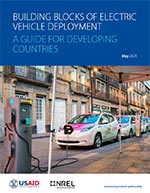
Powering Post-COVID-19 Resilient Recovery with Green Stimulus - March 2021
This quick read focuses on mid-term recovery and long-term planning to address the following question: What economic recovery solutions following the COVID-19 pandemic can support power sector resilience, support future growth, decarbonize electricity generation, and strengthen the power sector against future threats?
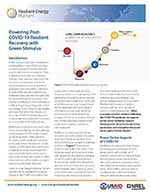
Electrifying Transit: A Guidebook for Implementing Battery Electric Buses – April 2021
This guidebook provides transit decision-makers and relevant stakeholders an overview of battery electric bus facts, data, and considerations important for planning their implementation in a variety of jurisdictions.
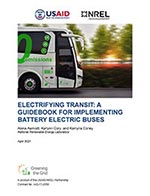
Preparing Distribution Utilities for the Future – Evolving Customer Consumption in Renewable Rich Grids – April 2021
This technical report spans across two tracks of research. The power procurement track examines the contribution that utility-scale renewable energy procurement provides to distribution utilities, from both energy and capacity perspectives. The distributed energy resources track assesses the impact of emerging technologies like rooftop solar PV, battery energy storge, and electric vehicles on the evolution of a distribution utility's net load.
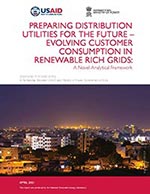
Developing Southeast Asia Solar Resource Data to Support the Clean Energy Transition in the Region – April 2021
This fact sheet provides a high-level overview of the new Southeast Asia solar resource data added to the RE Data Explorer tool and how high-quality, robust, and reliable resource data are at the core of critical decision-making.
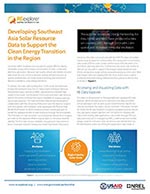
Watch and Learn:
Storage Plus – Exploring the Potential for Energy Storage and Generation Hybrids – April 20, 2021
Informing Renewable Energy Project Development with the RE Data Explorer – April 28, 2021
Enabling Data-Driven Decision Making Globally – The RE Data Explorer – April 29, 2021
Subscribe to our Newsletter
To stay up to date with the latest news, updates, and events from the USAID-NREL Partnership, subscribe to our quarterly newsletter.
Share


